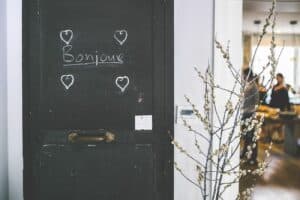Transcript of the video
I've just returned from Montreal, Quebec, where I spent a few days. As you probably know, French is spoken in Quebec. In addition to certain words that are pronounced differently, there are also many words that are different between Quebec French and French from France.
During my trip, I took note of all the words I heard that were different, and that's what we're going to look at together today. Of course, I'm not a specialist in Quebec French. All the words we're going to see are words I heard during my trip. Also, I'd like to make it clear that there's no such thing as better French. There are just differences depending on the region or culture. Even in France, there are words that vary according to North and South, for example.
Let's start with the first difference. The bathroom and the toilet. In a Quebec restaurant, you can ask where the bathroom is. In France, you'll always say "les toilettes". If you talk to a French person about a bathroom, for them it's the room in the house where there's a bath, a shower, a sink. It's the place where you wash and get ready. In Quebec, you can use salle de bain to refer to the toilet.
The bill and the check. In France, when you're in a restaurant, you ask for the bill. In Quebec, the waiter may say, "Est-ce que vous voulez la facture?" The word facture is also used in French, but it doesn't mean the same thing. In a restaurant, the waiter may also ask you, when you pay the bill, if you want a bill. But in France, an invoice is like an accounting document. It's something for the accounting department. Generally speaking, if you ask for an invoice in a restaurant, it's because you're a professional and you want to be able to make an expense report for your business.
A tank and a car. This one can be misleading. In Quebec, a char is simply a car. But for a French person, a char is a military tank, a military vehicle. Or this word can also be used to refer to a carriage used in ancient times, pulled by animals. A Québécois might say "Je pars en vacances avec mon char" ("I'm going on vacation with my tank"), but a Frenchman would never say that.
Before I get to the next word, I'd like to know if you're like me when you travel. Generally, after walking all day to visit lots of things, at 9:30 pm, I'm claquée, that means exhausted in colloquial French, and I'm back at my hotel or the Airbnb I've rented. Of course, it's too early to go to sleep, so I like to, as at home, watch a little series or show. The only problem is that not all the content I usually watch is available abroad. But fortunately, there's a very handy tool out there called NordVPN.
Today, NordVPN is sponsoring this video, and I'm going to tell you a little more about it, and especially how it can be useful to you as a French learner. A VPN is a tool that lets you change the location of your Internet connection, and therefore of your computer or phone. This allows you to access content that is normally unavailable in the geographical area where you are located. As you can see, it was thanks to this VPN that I was able to continue watching my favorite French TV shows from Canada.
For those of you learning French, this system is extremely useful. It allows you to watch authentic content on French TV channel websites. In Montreal, I've also gone to work for Hellofrench in cafés where I wasn't 100% sure that the Wi-Fi was secure. In this type of situation, having a VPN also helps you secure your connection, since it will protect your data. If you're like me and work just about anywhere, this can really put your mind at rest.
NordVPN has a special offer of 2 years + 4 months free if you follow the link that appears on the screen and that I added in the description of my video. You have 30 days to change your mind and receive a full refund. So there's little risk in trying it out.
The blonde and the girlfriend or lover. In Quebec, to talk about your lover, your girlfriend, you say "ma blonde". In France, if we say "la blonde", we're simply talking about a girl with blond hair. The "chum" is the boyfriend or lover in French. Mon chum means my lover or my boyfriend. This word doesn't exist in France. For example, I can say "J'ai rencontré mon chum dans un bar" (I met my chum in a bar). If I'm in a clothing store and I go to try on clothes in Quebec, I'll say "I have six pieces to try on." In France, we'll always say "J'ai six pièces à essayer." In French, a piece is a part of something. For example, I might say "J'ai mangé un morceau de gâteau." But we never use it to refer to a piece of clothing.
French toast and French French toast. Yes, the way we refer to French toast varies between France and Quebec. I learned this in a restaurant by looking at the menu. When I saw pain doré, I really wondered what it was, and luckily there were pictures. Bienvenue en québécois and you're welcome, please, in French from France. In France, when we use the word "bienvenue", it's always to welcome someone who has just arrived in a new place. For example, I might say "Bienvenue en France!" or "Bienvenue sur ma chaîne YouTube!" In Quebec, you can use it this way, but you can also use it in place of "you're welcome" For example, I was at a restaurant and the waiter put down my dish. I said "Thank you" and he replied "Welcome" I think it's literally a translation of the English "You are welcome."
The convenience store and the mini-mart. In Montreal, I saw a lot of convenience stores. In France, a dépanneur is a garagiste. It's the person you call if you have a problem with your car. For example, if I have a flat tire, I call a dépanneur and he comes to take my car. In Montreal, convenience stores are mini-markets, little stores that are usually open later than the others, where you can buy basic necessities, where you have a small selection of products. It's not like a big supermarket.
The job and the work, the employment, the position. I've heard several people in Montreal use the expression "la job". For example, "I start my job at the supermarket tomorrow." In France, we can also use the word "job", but it will be masculine. "For example, "I start my new job tomorrow. Whereas in Quebec, it's a feminine word. But the word "job" in France is still less used. I didn't mention it, but in French it's rather colloquial. It's still less used than words like boulot or taf.
Magasiner and faire les courses, to shop in stores. Magasiner, this word is not used at all in France, even in another context. I heard it for the first time in a supermarket at the automatic checkout. After paying for my groceries, there was a message that read "Thank you for shopping at Jean Coutu." Jean Coutu is a chain of stores.
Gougounes and flip-flops. This word, too, I discovered while strolling through a decorating store. Luckily, there was an illustration, so I was able to understand what it was. Gougounes are French for "flip-flops". They're shoes, usually made of plastic, that you're going to use, that you're going to put on at the beach or when you're at home.
Crisse. Crisse, I've heard it a lot of times and in different forms, because we've been to improv shows and a stand-up show with comedians. Crisse is the equivalent of "ptain" in France. It's an expletive used to punctuate sentences. It can be used to show anger or annoyance, but also astonishment. For example, if I have a cold, I might say "Crisse, j'en ai marre de couser." Unlike "ptain" in French, "crisse" can also be conjugated, used as a verb. In an improv show, at one point, someone said this phrase "On s'en crisse de ton histoire." I guess that means we don't give a damn about your story.
A smart phone and a smartphone. In French, we'll keep the same word as in English, we'll just adapt the pronunciation a little to the French, but the Québécois have decided to translate this word and call it a smartphone.
A pick-up point and a click and collect. I was very surprised when I saw a sign on the front of a store in Montreal that read "Entrée pour la cueillette". That's when you order something on the Internet and come to the store to pick it up.
The video is finished for today. I hope you enjoyed it. If you did, please put a "like" to support me and my work. You know it's very important for my videos to stand out better in YouTube. If you're new around here, don't forget to subscribe and activate the bell so you don't miss any of my videos and keep progressing in French. See you soon.







